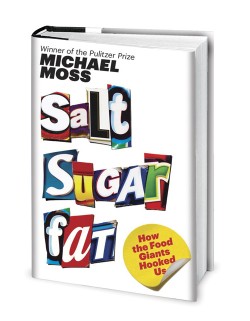FRESH AIR: Dealing Coke to customers called “heavy users.” Selling to teens in an attempt to hook them for life. Scientifically tweaking ratios of salt, sugar and fat to optimize consumer bliss. In his new book, Salt Sugar Fat: How the Food Giants Hooked Us, Pulitzer Prize-winning journalist Michael Moss goes inside the world of processed and packaged foods. Moss begins his tale back in 1999, when a vice president at Kraft addressed a meeting of top executives of America’s biggest food companies. His topic: the growing public health concerns over the obesity epidemic and the role packaged and processed foods were playing in it. Michael Mudd stated his case, pleading with his colleagues to pay attention to the health crisis and consider what companies could do  to hold themselves accountable. According to Moss, the first response came from the CEO of General Mills. “[He] got up and made some very forceful points from his perspective,” Moss tells Fresh Air’s Dave Davies, “and his points included this: We at General Mills have been responsible not only to consumers but to shareholders. We offer products that are low-fat, low-sugar, have whole grains in them, to people who are concerned about eating those products. “Bottom line being, though, that we need to ensure that our products taste good, because our accountability is also to our shareholders. And there’s no way we could start down-formulating the usage of salt, sugar, fat if the end result is going to be something that people do not want to eat.” In Salt Sugar Fat, Moss details how those three ingredients became key to the success of processed and packaged foods — and how they are fueling the nationwide obesity epidemic. Employing scientists to dissect elements of the palate and tweak ratios of salt, sugar and fat to optimize taste, the processed food industry, Moss says, has hooked consumers on their products the same way the cigarette industry hooked smokers on nicotine.Since that meeting in 1999, when executives declined to craft an industrywide standard for more healthful products, some companies, like Kraft, have tackled the issue unilaterally, altering recipes to cut down on salt, sugar and fat. Moss’ research, however, indicates that government regulation may be necessary to implement industrywide standards in the interest of public health. “I was surprised to hear from the former CEO of Philip Morris, who is no friend of government, no friend of government regulation,” says Moss, “to tell me that, ‘Look, Michael, in the case of the processed food industry, what you’re looking at is a total inability on their part to collectively decide to do the right thing by consumers on the health profile of their products. In this case, I can see how you might need government regulation if [for] nothing else [than] to give the companies cover from the pressure of Wall Street.’ ”
to hold themselves accountable. According to Moss, the first response came from the CEO of General Mills. “[He] got up and made some very forceful points from his perspective,” Moss tells Fresh Air’s Dave Davies, “and his points included this: We at General Mills have been responsible not only to consumers but to shareholders. We offer products that are low-fat, low-sugar, have whole grains in them, to people who are concerned about eating those products. “Bottom line being, though, that we need to ensure that our products taste good, because our accountability is also to our shareholders. And there’s no way we could start down-formulating the usage of salt, sugar, fat if the end result is going to be something that people do not want to eat.” In Salt Sugar Fat, Moss details how those three ingredients became key to the success of processed and packaged foods — and how they are fueling the nationwide obesity epidemic. Employing scientists to dissect elements of the palate and tweak ratios of salt, sugar and fat to optimize taste, the processed food industry, Moss says, has hooked consumers on their products the same way the cigarette industry hooked smokers on nicotine.Since that meeting in 1999, when executives declined to craft an industrywide standard for more healthful products, some companies, like Kraft, have tackled the issue unilaterally, altering recipes to cut down on salt, sugar and fat. Moss’ research, however, indicates that government regulation may be necessary to implement industrywide standards in the interest of public health. “I was surprised to hear from the former CEO of Philip Morris, who is no friend of government, no friend of government regulation,” says Moss, “to tell me that, ‘Look, Michael, in the case of the processed food industry, what you’re looking at is a total inability on their part to collectively decide to do the right thing by consumers on the health profile of their products. In this case, I can see how you might need government regulation if [for] nothing else [than] to give the companies cover from the pressure of Wall Street.’ ”
RELATED: Anti-Soda Tax Councilman Gets $30,000 Campaign Contribution From Beverage Mogul

